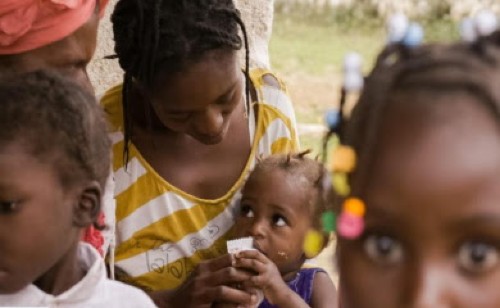UNITED NATIONS – The United Nations (UN) children’s organization, UNICEF, is warning that armed violence has intensified the number of children in Haiti suffering from severe acute malnutrition (SAM), also known as severe wasting, which has skyrocketed in the country by 30 percent compared to last year.
 (UNICEF photo)UNICEF said a national nutrition Standardized Monitoring and Assessment of Relief and Transitions (SMART) survey conducted this year reveals that child malnutrition is on the rise in the French-speaking Caribbean Community (CARICOM) country, plagued by violence, worsening food insecurity and cholera.
(UNICEF photo)UNICEF said a national nutrition Standardized Monitoring and Assessment of Relief and Transitions (SMART) survey conducted this year reveals that child malnutrition is on the rise in the French-speaking Caribbean Community (CARICOM) country, plagued by violence, worsening food insecurity and cholera.
It said more than 115,600 children are expected to suffer from severe wasting in 2023, compared to 87,500 last year.
At present, one in five children suffer from some form of malnutrition in several communes of the Metropolitan area of the Haitian capital Port au Prince that has been plagued by armed violence for over two years.
UNICEF said children are paying the heaviest toll in the capital, with many communes showing high to very high levels of severe wasting. West Department, the district most severely impacted by conflict, expressed a 7,5 percent acute malnutrition rate, which is two points higher than the national average.
“In Haiti, more and more mothers and fathers can no longer provide appropriate care and nutrition to their children, and parents cannot take them to health centers due to increasing horrific violence caused by armed groups,” said Bruno Maes, UNICEF Representative in Haiti, “Combined with the ongoing cholera outbreak, more children are suffering from severe wasting more rapidly, and will die if urgent measures are not taken.”
The violence in Haiti is worsening at concerning speed. More than 600 people were killed in the month of April alone across Port-au-Prince, according to the UN Integrated Office in Haiti (BINUH).
The conflict caused by armed groups has restricted children’s access to basic nutrition, health services, and safe water, hygiene and sanitation (WASH) conditions. Coupled with worsening food insecurity and civil unrest, the crisis has led to a far-reaching deterioration of the nutrition crisis across the country.
The malnutrition crisis is further compounded by a persisting cholera outbreak, which has been a blow to children suffering from severe wasting. More than 41,000 suspect cholera cases have been reported in Haiti, of which 46 percent of cases are under the age of 14.
As the disease rampages neighborhoods afflicted by violence, cholera and malnutrition create a double burden that the national health system is unable to respond to due to critical human resource shortages and lack of supplies.
Nearly one in four children in Haiti also suffer from chronic malnutrition, known as stunting, which has long-lasting physical consequences. As a result of poor health and malnutrition, stunted children fail to reach their physical and cognitive capabilities.
Without nutrition and child survival interventions urgently scaled up to reduce morbidity and mortality associated with severe wasting, as well as preventing new malnutrition cases, the situation could further deteriorate between now and October 2023.
UNICEF said it urgently needs US$17 million in the early stages of the response to scale up early detection of child wasting, procure an additional 84,000 cartons of Ready-to-Use Therapeutic Foods (RUTF), and deliver a comprehensive package of nutrition, health, WASH, early childhood development (ECD), and child protection interventions to improve the emergency for children in Haiti.
A funding gap could put the lives of more than 100,000 children at risk of immediate death, UNICEF said, noting with armed violence forcing women and children to flee their homes in Haiti, humanitarian needs remain high while funding is dwindling.
In 2023, UNICEF said it will provide life-saving goods and services to children and vulnerable populations in the context of insecurity, health and social and economic crises in Haiti, provided that sufficient and timely funding of US$210.3 million requested is received. To date, only 15 percent of funding has been allocated.


